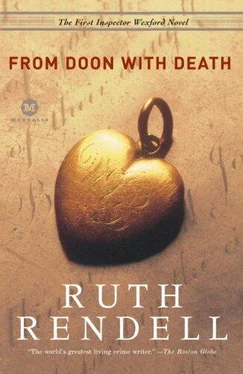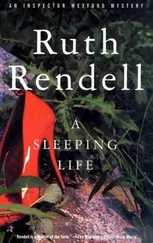‘Madam is having her tea,’ she said, unimpressed by Wexford’s bulk, his air of justice incarnate. ‘I’ll see if she can speak to you.’
‘Just tell her Chief Inspector Wexford would like a word with her.’ Affected by the atmosphere, he added, ‘If you please.’
He stepped over the threshold and into the hall. It was as big as a large room and, surprisingly enough, the tapestries of hunting scenes stretched on frames and attached to the walls did nothing to diminish its size. Again there was the same absence of colour, but not quite a total absence.
Worked into the coats of the huntsmen, the palfreys of their mounts, Wexford caught the gleam of dull gold, ox-blood red and a hint of heraldic murrey.
The old woman looked defiantly at him as if she was prepared to argue it out, but as Wexford closed the front door firmly behind him someone called out:
‘Who is it, Nanny?’
He recognized Mrs Quadrant’s voice and remembered how the night before she had smiled at Missal’s crude joke.
Nanny just got to the double doors before him. She opened them in a way he had only seen done in films and, incongruously, grotesquely, there rose before his eyes a shot, ridiculous and immensely funny, from a Marx Brothers picture. The vision fled and he entered the room.
Douglas and Fabia Quadrant were sitting alone at either end of a low table covered by a lace cloth. Tea had apparently only just been brought in because the book Mrs Quadrant had been reading was lying open and face-upwards on the arm of her chair. The soft old silver of the teapot, the cream jug and the sugar bowl was so brightly polished that it reflected her long hands against the sombre colours of the room. It was forty years since Wexford had seen a brass kettle like this one boiling gently over a spirit flame.
Quadrant was eating bread and butter, just plain bread and butter but crustless and cut thin as a wafer.
‘This is an unexpected pleasure,’ he said, rising to his feet. This time there were no clumsy incidents with cigarettes. He restored his cup almost gracefully to the table and waved Wexford into an armchair.
‘Of course, you know my wife?’ He was like a cat, Wexford thought, a slim detached tom-cat who purred by day and went out on the tiles at night.
And this room, the silver, the china, the long wine-coloured curtains like blood transmuted into velvet! And amidst it all Mrs Quadrant, dark-haired, elegant in black, was feeding cream to her cat. But when the lamps were lit he stole away to take his feline pleasures under the bushes in the creeping dark.
‘Tea, Chief Inspector?’ She poured a driblet of water into the pot.
‘Not for me, thank you.’ She had come a long way, Wexford thought, since those days in the wilderness garden, or perhaps, even then, her gym tunic had been of a more expensive make, her hair more expertly cut than the other girls’. She’s beautiful, he thought, but she looks old, much older than Helen Missal. No children, plenty of money, nothing to do all day but feed cream to a ranging cat. Did she mind his infidelity, did she even know about it?
Wexford wondered curiously if the jealousy that had reddened Missal had blanched and aged Quadrant’s wife.
‘And what can I do for you?’ Quadrant asked. ‘I half expected a visit this morning. I gather from the newspapers that you aren’t making a great deal of headway.’ Lining himself up on the side of the law, he added, ‘An elusive killer this time, am I right?’
‘Things are sorting themselves out,’ Wexford said heavily. ‘As a matter of fact it was your wife I wanted to speak to.’
‘To me?’ Fabia Quadrant touched one of her platinum ear-rings and Wexford noticed that her wrists were thin and her arms already corded like a much older woman’s. ‘Oh, I see. Because I knew Margaret, you mean. We were never very close, Chief Inspector. There must be dozens of people who could tell you more about her than I can.’
Possibly, Wexford thought, if I only knew where to find them.
‘I didn’t see her at all after her family moved away from Flagford until just a few weeks ago. We met in the High Street and had coffee. We discovered we’d gone our separate ways and - well!’
And that, Wexford said to himself, contrasting Tabard Road with the house he was in, must be the understatement of the case. For a second, building his impressions as he always did in a series of pictures, he glimpsed that meeting: Mrs Quadrant with her rings, her elaborately straight hair, and Margaret Parsons awkward in the cardigan and sandals that had seemed so comfortable until she came upon her old companion. What had they in common, what had they talked about?
‘What did she talk about, Mrs Quadrant?’
‘Oh, the changes in the place, people we’d known at school, that sort of thing.’ The governess and the lady of the manor. Wexford sighed within himself.
‘Did you ever meet anyone called Anne Ives?’
‘You mean Margaret’s cousin? No, I never met her. She wasn’t at school with us. She was a typist or a clerk or something.’
Just another of the hoi-polloi, Wexford thought, the despised majority, the bottom seventy-five per cent.
Quadrant sat listening, swinging one elegant leg. His wife’s condescension seemed to amuse him. He finished his tea, crumpled his napkin and helped himself to a cigarette. Wexford watched him take a box of matches from his pocket and strike one. Matches! That was odd. Surely if he had behaved consistently Quadrant would have used a lighter, one of these table lighters that look like a Georgian teapot, Wexford thought, his imagination working. There had been a single matchstick beside Mrs Parsons’ body, a single matchstick half burnt away…
‘Now, Margaret Godfrey’s boy friends, Mrs Quadrant. Can you remember anyone at all?’
He leant forward, trying to impress her with the urgency of his question. A tiny flash of something that might have been malice or simply recollection darted into her eyes and was gone. Quadrant exhaled deeply.
‘There was a boy,’ she said.
‘Try to remember, Mrs Quadrant.’
‘ I ought to remember,’ she said, and Wexford was sure she could, certain she was only stalling for effect. ‘It was like a theatre, a London theatre.’
‘Palladium, Globe, Haymarket?’ Quadrant was enjoying himself. ‘Prince of Wales?’
Fabia Quadrant giggled softly. It was an unkind titter, sympathetic towards her husband, faintly hostile to the Chief Inspector. For all his infidelity Quadrant and his wife shared something, something stronger, Wexford guessed, than ordinary marital trust
‘I know, it was Drury. Dudley Drury. He used to live in Flagford.’
‘Thank you, Mrs Quadrant. It had just crossed my mind that your husband might have known her.’
‘I?’ As he spoke the monosyllable Quadrant’s voice was almost hysterically incredulous. Then he began to rock with laughter. It was a soundless cruel mirth that seemed to send an evil wind through the room. He made no noise, but Wexford felt scorn leap out of the laughing man like a springing animal, scorn and contempt and the wrath that is one of the deadly sins. ‘I, know her? In that sort of way? I assure you, dear ChiefInspector, that I most emphatically knew her not.’
Sickened, Wexford turned away. Mrs Quadrant was looking down into her lap. It was as if she had withdrawn into a sort of shame.
‘This Drury,’ Wexford said, ‘do you know if she ever called him Doon?’
Was it his imagination or was it simply coincidence that at that moment Quadrant’s laughter was switched off like a wrenched tap?
‘Doon?’ his wife said. ‘Oh, no, I never heard her call anyone Doon.’
She didn’t get up when Wexford rose to go, but gave him a dismissive nod and reached for the book she had been reading. Quadrant let him out briskly, closing the door before he reached the bottom of the steps as if he had been selling brushes or reading the meter. Dougie Q! If there was ever a fellow who could strangle one woman and then make love to another a dozen yards away … But why? Deep in thought, he walked down the Kingsbrook Road, crossed to the opposite side of the road and would have passed Helen Missal’s garage unseeing but for the voice that hailed him.
Читать дальше











